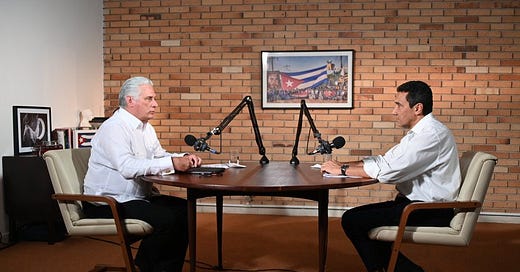The new YouTube program, “Desde la Presidencia,” is dedicated to “providing information for reflecting, analyzing, and proposing solutions to the pressing problems in Cuban society,” as expressed by Cuban President Miguel Díaz-Canel. The third episode of the program, recorded on April 18, addresses the question, what is the situation of transportation in Cuba? Appearing with Díaz-Canel on the program was the Cuban Minister of Transportation, Eduardo Rodríguez Dávila.
Díaz-Canel noted that the issue of the problems in transportation is related to questions that were addressed in the second episode on the problems of the Cuban economy. In the second episode, it was explained that the problems in the delivery of food have been caused by the intensification of the economic, commercial, and financial blockade beginning in 2014, which included more active implementation of the financial restriction…



